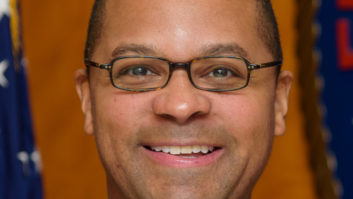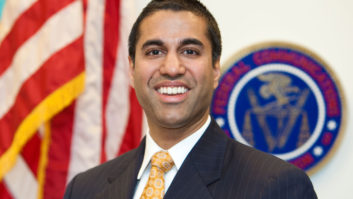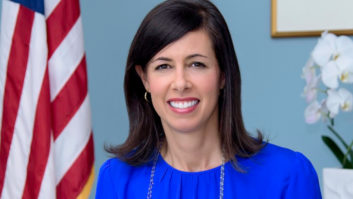Deborah McAdams contributed to this report.
Ajit Pai has confirmed he will be chairman of the FCC under President Donald Trump.
The U.S. commercial broadcast industry in general has a very positive view of Pai, who has frequently spoken of his love of radio growing up in Kansas, and who has taken an active interest in issues such as AM revitalization. Some consider him the most broadcast-savvy commissioner since Jim Quello. Pai is a Republican and will succeed departed Chairman Tom Wheeler, a Democrat, in the chairman’s seat.
“I am deeply grateful to the president of the United States for designating me the 34th chairman of the Federal Communications Commission,” Pai said in a statement. “I look forward to working with the new administration, my colleagues at the commission, members of Congress and the American public to bring the benefits of the digital age to all Americans.”
The announcement had been expected since last week. Early headlines about Pai’s apparent succession have focused on his opposition to net neutrality. Meanwhile, some news outlets abroad such as the Hindustan Times noted that Pai becomes the fourth senior-level Indian-American in Trump’s administration, along with Nikki Haley, Seema Verma and Preet Bharara.

Pai is shown with NAB head Gordon Smith at the 2014 Radio Show.
Earlier, in response to news reports, National Association of Broadcasters President/CEO Gordon Smith had said NAB supported Pai as chairman “without qualification,” calling him “a known quantity who brings integrity, good humor and a fierce intellect to the commission.”
The Multicultural Media, Telecom and Internet Council also had put out an anticipatory statement. President and CEO Kim Keenan was quoted saying, “Since becoming a commissioner in 2012, Commissioner Pai has been on the right side of a number of issues supported by MMTC, including a host of practical approaches to advancing diversity and inclusion, relaxation of the broadcast foreign investment rules, and authorization of FM translators for struggling AM stations. His proposals for incentivizing broadband investment in underserved communities are grounded in the best work of Jack Kemp. Moreover, he has demonstrated a willingness to consider moving away from ‘silos’ in communication industries toward platform neutrality – a theme that originated with former FCC Chairman Bill Kennard. This outlook has the potential to open the doors to ownership opportunities for people of color.” It called him “an innovative, knowledgeable, and fair commissioner whose door is open to hear all sides of an issue.”
Taking a slightly different tone, the National Hispanic Media Coalition said it hoped the new chairman would be “truly open to the diverse viewpoints of all stakeholders as he leads his agency in service of the people of this country and the public interest.” But it said Pai’s views “have often diverged from those of NHMC and other groups representing the voices of communities of color and vulnerable populations on a number of key telecommunications issues,” including the preserving the open internet, support for for universal access to broadband and the impact of consolidation in media and telecommunications.
The Consumer Technology Association said, “Commissioner Pai is a champion for innovation, leading the way on key issues that impact the growth of our modern communications networks, ensuring consumers’ access to those networks in underserved areas and cautioning against unnecessary, growth-chilling regulation.”
However the organization Free Press was harsh. President and CEO Craig Aaron stated, “Ajit Pai has been on the wrong side of just about every major issue that has come before the FCC during his tenure. He’s never met a mega-merger he didn’t like or a public safeguard he didn’t try to undermine. He’s been an inveterate opponent of Net Neutrality, expanded broadband access for low-income families, broadband privacy, prison-phone justice, media diversity and more.” It called him “an effective obstructionist who has always been eager to push out what the new presidential administration might call alternative facts in defense of the corporate interests he used to represent in the private sector.”
The Senate does not need to act on the announcement, because Pai is already a sitting commissioner. The current panel includes his fellow Republican Michael O’Rielly; Pai often acted in concert with him when the two sat in the minority on the panel. Also remaining is Democrat Mignon Clyburn, a former acting chair. Two slots are unfilled at present.
Reports first emerged of Pai’s appointment on Friday, Jan. 20, Inauguration Day, when the philosophical Kansan retweeted Charles C.W. Cooke, editor of the National Review Online following Sen. Roy Blunt’s (R-Mo.) speech: “‘Every four years since 1789.’ No exceptions, whatever the circumstances. Remarkable.”
Pai, senior Republican on the commission, was confirmed May 7, 2012. He has since opposed network neutrality and supported broadcasting in a number of instances. He advocated the approval of ATSC 3.0 at a Senate oversight hearing last September. He notably opposed the June 2015 vacant channel proposal that would leave one UHF channel open for unlicensed devices after the auction.
“I cannot support the commission’s proposal to prioritize the spectrum needs of unlicensed white space devices over those of translators and LPTV stations,” he said in his dissent.
Pai also dissented on the structure of the incentive auction laid out in an August, 2015 Public Notice. He objected to repacking TV stations in the wireless band and the duplex gap, reserving spectrum for bidders with minimal low-band holdings and leaving two channels vacant for unlicensed devices.
“You can’t say that you’re for LPTV stations and TV translators but then deliberately deny them spectrum within the broadcast television band,” he said.
Pai also split the sheet with the Democratic-led commission last June on continued media ownership restrictions: “Last month, the FCC had no problem approving not one, but two multibillion dollar cable mergers. Last year, it signed off on AT&T’s acquisition of DirecTV. Yet, it now gets the vapors at the prospect of a newspaper in Scranton, Pa., owning a single radio station. Whatever the motivation for the chairman’s proposal, it has nothing to do with the evidence in the record, principled decision-making, or the law. Indeed, given current trends, it is likely that the Commission’s newspaper-broadcast cross-ownership restrictions will outlive the print newspaper industry itself.”
Chairman Pai graduated from Harvard and the University of Chicago Law School, served as a law clerk for a federal judge in Louisiana, then worked his way up the ranks of Washington telecommunications policymakers through the Department of Justice (twice), the U.S. Senate Judiciary Committee (also twice; once as deputy chief counsel for Sen. Jeff Sessions, who has been tapped for Attorney General), to the FCC, then a partner in D.C. law firm Jenner & Block LLP, then back to the commission in 2012.







